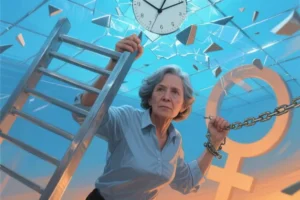Romantic relationships often transcend age, yet societal perceptions and practical realities shape how we navigate them. For many American women, dating men in their fifties evokes complex emotions—curiosity, attraction, but also hesitation. While love knows no boundaries, four key factors explain why this age gap can feel daunting. Let’s unpack these concerns and explore their roots in modern dynamics.
Table of Contents

1. The Biological Clock vs. Life Stage Mismatch
A primary concern lies in the diverging physical and lifestyle trajectories. A woman in her twenties or thirties may prioritize adventure, career growth, or starting a family—energies that clash with a fifty-something partner’s slower-paced, stability-focused rhythm. While he might relish quiet evenings or established routines, she could crave spontaneity, travel, or late-night conversations. This mismatch in vitality often sparks fears of stagnation or unmet needs.
Image suggestion: A split-screen graphic contrasting a woman hiking with friends and a man relaxing at home.
Biologically, aging also raises questions about long-term care. Women may worry about becoming caregivers prematurely, especially if health issues arise. According to the CDC, chronic conditions like hypertension and diabetes become more prevalent after 50, adding tangible stakes to romantic relationships with older partners.
2. Social Power Dynamics and Visibility
Men in their fifties often occupy senior professional roles, wielding financial and social influence. While this can be attractive, it also creates an imbalance. Younger women may feel overshadowed in social settings or judged for perceived opportunism (“Is she with him for money?”). Societal stereotypes—like the “trophy wife” trope—linger, amplifying self-consciousness.
Image suggestion: A boardroom scene with a middle-aged man speaking, juxtaposed with a younger woman in a casual setting.
A 2022 Pew Research study found that 58% of Americans view large age gaps in romantic relationships skeptically, particularly when the man is older. This scrutiny can strain intimacy, as women navigate external judgments alongside internal doubts about autonomy and equality.
3. Divergent Emotional Languages
Emotional needs evolve with age. A fifty-something man may prioritize companionship and peace over fiery passion, shaped by decades of career pressures or past relationships. Younger women, however, often seek validation, excitement, and growth—desires that demand active engagement.
Psychologist Dr. Helen Fisher notes that younger brains are wired for novelty-seeking, while older adults favor emotional stability. In romantic relationships, this translates to mismatched communication styles: she might crave grand gestures, while he leans toward practical support. Over time, such gaps can erode connection if unaddressed.
Image suggestion: A split image of a couple arguing (younger woman) vs. a couple silently reading (older man).

4. The Shadow of an Uncertain Future
Long-term planning becomes fraught with age disparities. A woman in her thirties dating a 55-year-old faces tough questions: Will he retire while she’s still building her career? Can they align on parenting goals if he’s already an empty nester? Practical concerns—like retirement savings, healthcare costs, or widowhood risks—loom large.
Image suggestion: A timeline graphic showing contrasting life milestones (e.g., “His retirement” vs. “Her career peak”).
Moreover, cultural narratives frame older men as “temporary” partners, not lifelong equals. A UCLA study on romantic relationships found that 43% of women under 40 fear being “left behind” as older partners age, even if no immediate health issues exist.
Navigating the Divide: Is Compromise Possible?
While these challenges are real, they’re not insurmountable. Successful age-gap romantic relationships thrive on:
- Transparent communication: Addressing fears early (e.g., “How will we handle retirement?”).
- Shared values: Prioritizing emotional alignment over societal expectations.
- Boundary-setting: Protecting individuality amid merged social circles.
As Carl Rogers emphasized, connection hinges on mutual understanding—not age. For women hesitant about dating older men, the key lies in balancing pragmatism with openness. After all, love often blooms where logic fears to tread.




